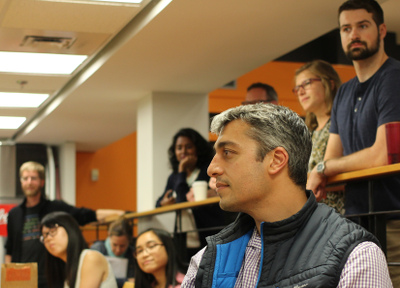Actively Encouraging Open Government Engagement
on
 I have been very encouraged by the growth of Open Government initiatives around the world. It’s done so much to help make governments more agile, responsive, accessible and affordable. Success of this model depends on a community of contributors, most of who who lie outside of government. This means that they also fall outside of the hierarchical chain of command.
I have been very encouraged by the growth of Open Government initiatives around the world. It’s done so much to help make governments more agile, responsive, accessible and affordable. Success of this model depends on a community of contributors, most of who who lie outside of government. This means that they also fall outside of the hierarchical chain of command.
How the public sector engages with that community may well determine how effective these initiatives are.
Supporting contributors
Governments don’t have either the mechanism or capacity to give money to people who contribute good ideas to their policies or practices. At some point government departments might support contributors through Patreon or Flattr. Until then, there aren’t financial mechanisms to support the input of external experts.
With blogging and social media, there is actually something very valuable that governments can and should be doing. Governments can highlight contributors to open gov initiatives. It costs the public sector nothing to name individuals in social media, blogs and press releases.
I have seen very few instances where Open Government initiatives specifically call to the community. I think of the UK’s GDS Government design principles stands out. Principle “10 Make things open: it makes things better” ends with:
“Much of what we’re doing is only possible because of open source code and the generosity of the web design community. We should pay that back.”
That recognition & humility should be baked into the workings of open government teams, but often seems to be forgotten. Open government can only be sustained if people outside of government departments are engaged. People get involved because they have an interest. If they get recognition for their contributions they are more likely to continue.
Open communities
Having been involved in open source communities for nearly 20 years, I can say that recognition of efforts matters a great deal. Individuals often begin contributing to open projects to “scratch an itch”. It allows individuals an opportunity to:
- work on projects that that they are interested in independently,
- to demonstrate mastery and
- also allows them to contribute to a project with a greater purpose.
There is a rising interest in Civic tech across Canada. Citizens are excited about opportunity to work with government to make improvements in our society.
This is not just a benefit to individuals, but also the organizations that employ them. Many organizations choose to give their employees time to contribute to open projects. It gives employers:
- greater exposure in the community,
- more confident employees,
- more robust products and policies,
- a demonstration of thought leadership.
Changing the culture
There are a lot of successful open projects which actually have the role of a community manager. This position generally focuses on supporting and encouraging volunteers. Supporting people and improving their onboarding is important for insuring continued involvement. This won't be the exact model for government. I am confident that government has to learn how to better nurture those who are contributing. Simple public acknowledgements seem like an easy first step. Many open projects list major contributors so that it is possible to see who has influenced the project. It becomes both a point of pride, but also something that individuals can use to highlight their professional experience.
Governments need to get better at acknowledging the communities that they depend on. Public sector employees seem especially shy about naming open source projects. If governments are to adopt an Open First approach, then this acknowledgement of the open communities that they are drawing on is key.
This is part of the culture change that needs to happen inside government. This is a time of year when many of us are conscious to be grateful for what we have received. I am calling for public servants to look for opportunities to give a shout-out to those civic tech proponents who help make open government possible.
Share this article
About The Author
Mike Gifford is the founder of OpenConcept Consulting Inc, which he started in 1999. Since then, he has been particularly active in developing and extending open source content management systems to allow people to get closer to their content. Before starting OpenConcept, Mike had worked for a number of national NGOs including Oxfam Canada and Friends of the Earth.




Add new comment